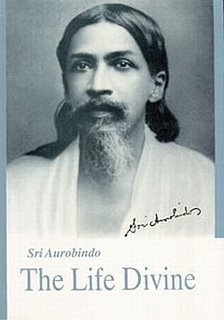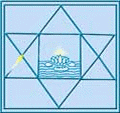 |
The Ascent of Life
The Law of Love
The beginnings of love
It is not in isolation but by association that a permanence of the species can be ensured. This automatically leads to ‘the principle of co-operation and mutual help, the desire for others, the desire of the wife, the child, the friend and helper, the associated group, the practice of association, of conscious joining and interchange’ and these ‘are the seeds out of which flowers the principle of love’ (The Life Divine, pg.214).
Love at first appears to be an ‘extended selfishness’ (Ibid) and this aspect may persist and dominate even in higher stages of evolution. Yet the finesse of more and more subtle planes of consciousness that unravels with the evolutionary trajectory, love also expands, becomes refined, aesthetic and beautiful. At a point when it is discovered that ‘the natural individual is a minor term of being and exists by the universal’ (Ibid), love can shift to an universal mode and even to a deep spiritual mode. ‘Once this is discovered, as it is inevitably discovered by man the mental being, his destiny is determined; for he has reached the point at which Mind can begin to open to the truth that there is something beyond itself; from that moment his evolution, however obscure and slow, towards that superior something, towards Spirit, towards Supermind, towards Supermanhood is inevitably predetermined’ (Ibid, pg.214-215).
|
|
It may be argued that love flowers in vitality, in the sphere of life-energy and bringing the mind-principle into it might complicate matters. Sri Aurobindo explains that without the involvement of the conscious mind, love cannot be durable or meaningful. ‘Love – the relative principle, not its absolute – is a principle of life, not of mind, but it can possess itself and move towards permanence only when taken up by the mind into its own light. What is called love in the body and the vital parts is mostly a form of hunger without permanence’ (Ibid, footnote, pg.218).
Love changes its denouement when Life enters its third status – the domain of the mind-principle. ‘This third status is a condition in which we rise progressively beyond the struggle for life by mutual devouring and the survival of the fittest by that struggle; for there is more and more a survival by mutual help and a self-perfectioning by mutual adaptation, interchange and fusion. Life is a self-affirmation of being, even a development and survival of ego, but of a being that has need of other beings, an ego that seeks to meet and include other egos and to be included in their life. The individuals and the aggregates who develop most the law of association and the law of love, of common help, kindliness, affection, comradeship, unity, who harmonise most successfully survival and mutual self-giving, the aggregate increasing the individual and the individual the aggregate, as well as individual increasing individual and aggregate aggregate by mutual interchange, will be the fittest for survival in this tertiary status of the evolution’ (Ibid,pg.218).
Status of the individual in love
Does the individual lose oneself in the fusion of love? Sri Aurobindo explains, ‘The conscious preservation of individuality along with the consciously accepted necessity and desire of interchange, self-giving and fusion with other individuals, is necessary for the working of the principle of love; for if either is abolished, the working of love ceases, whatever may take its place’ (Ibid, pg.217).
What then of the subject who wants to surrender in love to the extent of self-immolation, losing one’s identity completely in the love for one’s beloved? Sri Aurobindo hints that this would be a love suited for a status higher than the mind, perhaps a spiritual status. ‘Fulfilment of love by entire self-immolation, even with an illusion of self-annihilation, is indeed an idea and an impulse in the mental being, but it points to a development beyond this third status of Life’ (Ibid, pg.217-218).
Changing status of Love
The subconscious will in the physical life when manifested in the biological world after being animated by life-energy expresses itself through hunger and desire. Desire, which is first instinctive in the animal world becomes conscious in human life and is the basis of primitive love.
At the next stage, when the mind-principle enters the creative play, love grows in a changed status: desire is sublimated and transmuted. ‘The growth into the third status of life by the principle of association, the growth of love, does not abolish the law of desire, but rather transforms and fulfils it’ (Ibid, pg.219).
Transactions of Love
‘In its life-origin, the law of love is the impulse to realise and fulfil oneself in others and by others, to be enriched by enriching, to possess and be possessed because without being possessed one does not possess oneself utterly’ (Ibid). ‘For in its upward ascent it grows towards the rule of conscious unity in differentiation which is the divine law of the manifest Sachchidananda’ (Ibid, pg.218).
The achievement of a conscious unity in differentiation in love needs a conscious exchange of giving and receiving. At first, in a more physical milieu, the self-giving is yet mechanical and enjoys receiving and extracting from others rather than giving and surrendering. A greater quality of transaction ensues when ‘the joy of giving is equal to the joy of receiving and tends in the end to become even greater’ (Ibid, pg.219). This greater transaction needs a soul-support ‘to attain to the fulfilment of utter unity and has therefore to realise that which seemed to it not-self as an even greater and dearer self than its own individuality’ (Ibid).
The not-self is an entity that also changes its gradations. At first it is the unknown other who feels us with awe in primitive material life. With the efflorescence of vitality, there is a struggle ‘to master both self and non-self’.
With the introduction of the mind-principle, there ‘comes about through association and through love a recognition of the not-self as a greater self and therefore a consciously accepted submission to its law and need which fulfils the increasing impulse of aggregate life to absorb the individual; and there is a possession again by the individual of the life of others as his own and of all that it has to give him as his own which fulfils the opposite impulse of individual possession.’ (Ibid, pg.219-220)
In other words, the meaning of transactions in love is to create a balance between the individual and the aggregate, between physical life which supports the unique individual and vitality which thrives in unregulated associations. The Mind-principle regulates the associations to be meaningful. That is why, the resolution between the two opposite principles ‘ is attempted by the higher principle of Mind which alone can find the road towards the harmony intended, even though the harmony itself can only be found in a Power still beyond us’. (Ibid, pg.220)
Beyond Mind
The Mind itself is a transitional stage in evolution. Beyond Mind, the ‘not-self’ changes its denouement and increases in stature in terms of divinity. One comes to love not only one’s human counter-part but one’s Divine Self.
‘Therefore the perfect solution of the problem of Life is not likely to be realised by association, interchange and accommodations of love alone or through the law of the mind and the heart alone.
‘It must come by a fourth status of life in which the eternal unity of the many is realised through the spirit and the conscious foundation of all the operations of life is laid no longer in the divisions of body, nor in the passions and hungers of the vitality, nor in the groupings and the imperfect harmonies of the mind, nor in a combination of all these, but in the unity and freedom of the Spirit’ (Ibid).
Date of Update:
21-July-18
- By Dr. Soumitra Basu
|

